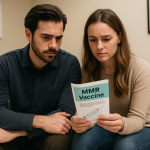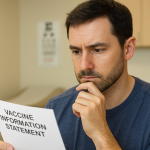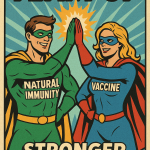Let’s get this out in the open:
If you’ve ever said or thought, “I’m not against vaccines, I just worry we don’t know the long-term effects yet,”—you’re not alone.
It’s a totally reasonable instinct.
You’re trying to think ahead. You’re protecting your future self. You’re not anti-science—you just don’t want to be surprised five years from now by something no one saw coming.
That kind of caution deserves respect.
But here’s what most people never get to hear in a soundbite or comment thread:
Scientists aren’t seriously concerned about long-term side effects. Not because they’re lazy. Not because they’re corrupt. But because they’ve seen this story before—hundreds of times. And they know how it ends.
So Let’s Talk About How Vaccines Actually Work
Most people think of vaccines like medications—take a pill, wait a while, see what happens.
But that’s not how vaccines behave.
Vaccines are a training session for your immune system. They’re in and out of your body fast. The mRNA vaccines used for COVID, for example, are gone from your system within a few days—the mRNA breaks down almost immediately after delivering its message.
Your immune system responds quickly—usually within a few weeks—and then stores that memory long-term.
That window, right after vaccination, is when side effects happen.
And that’s not a guess. It’s how all known vaccine biology works.
“But What If This One Is Different?”
Great question. Here’s why researchers say it’s not:
- We’ve been giving vaccines for over 100 years.
And in all that time, no major vaccine has ever caused new side effects years later. Not polio. Not MMR. Not flu shots. If side effects are going to happen, they show up within weeks—months at most. - We’ve studied these vaccines more than anything else.
The COVID vaccines have been administered to billions of people, tracked by dozens of countries, and studied in more than 10,000 peer-reviewed papers. That’s not a trial—that’s a microscope. - We have massive surveillance systems watching in real time.
Systems like VAERS, V-safe, and international equivalents collect safety data from the ground up. If anything unusual had emerged, it would’ve been caught—just like rare blood clot cases with the J&J shot were quickly identified and addressed.
What Do Scientists Mean by “Long-Term” Anyway?
When experts say they don’t expect long-term effects, they don’t mean they’ve looked into a crystal ball.
They mean this:
“There’s no plausible biological mechanism by which these vaccines would cause harm years later without showing any signs early on.”
In other words, they’re not guessing. They’re applying everything we know from a century of immunology, biology, and real-world data.
And the patterns are consistent:
- If a vaccine is going to cause problems, those problems show up fast.
- If problems don’t show up in the first few months, they almost never show up at all.
- And if you’ve vaccinated billions of people and still haven’t seen them? That’s not luck. That’s evidence.
The Real Long-Term Risk? Getting the Disease.
Here’s something we know for certain:
Long COVID is real.
Measles can wipe your immune memory.
Polio can return with paralysis years later.
The long-term consequences of the disease are well-documented and far more common than any vaccine-related issues.
So if we’re playing the long game—which is what cautious people should be doing—then vaccines aren’t the risky bet.
They’re the safer one.
You Weren’t Wrong to Ask. But Now You Deserve an Answer.
Science isn’t about shutting down questions—it’s about following the answers wherever the data leads.
And at this point, the data is leading somewhere pretty clear:
Long-term vaccine side effects aren’t lurking out there.
We’re not still waiting to find out. We’ve looked. We’re still looking. And what we’re seeing matches everything we’ve seen before:
✅ Vaccine side effects show up quickly.
✅ Late side effects are vanishingly rare.
✅ The COVID vaccines are following the same rulebook.
So if you’ve been holding out, not because you’re against vaccines—but because you just weren’t sure?
You’re not alone. But you’re also not stuck.
This chapter of the story is already written. And it ends, as it always has, with science doing what it does best: protecting people—and moving on.
Last Updated on June 27, 2025







